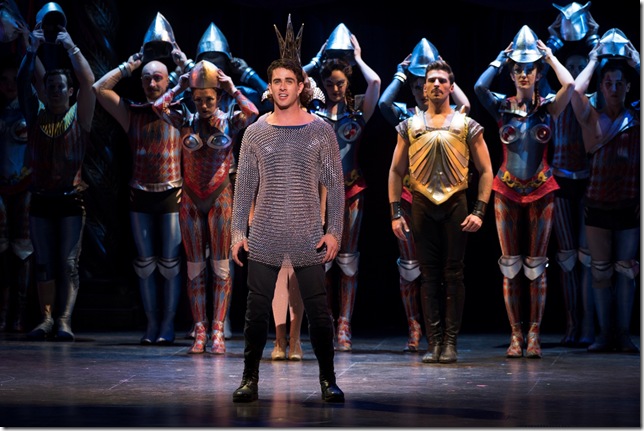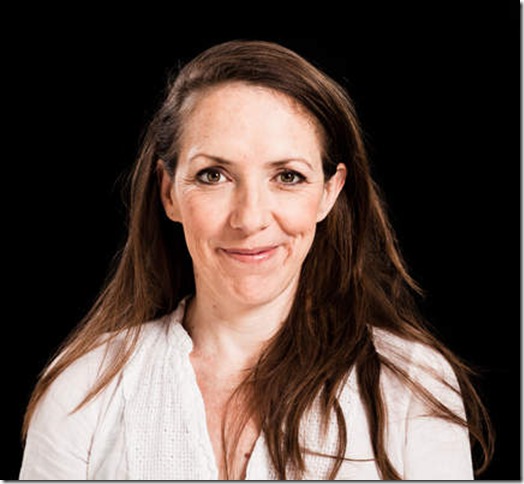Setting the musical Pippin inside a circus, as the recent Tony Award-winning revival does, seems perfectly natural to Gypsy Snider, the show’s co-choreographer and circus consultant.
“Circus is dangerous, physically dangerous. That is a theme in ‘Pippin,’ the idea that you would risk your life every day on stage. That became very much a part of re-writing the show,” she says. “We want to seduce Pippin into running away to join the circus, which entails all the excitement, but also the danger as well.”
Snider was born into the world of circus, thrown around by her parents at the age of 2 in The Pickle Family Circus. “I have been performing since I was 4 and really at the whim of what my parents needed. So one year I’m in a monkey costume, the next I’m doing a trapeze act.”
Eventually, Snider founded her own circus, Les Sept Doigts de la Main (The 7 Fingers of the Hand), a French-Canadian troupe based in Montreal. It was the company’s theatrically grounded work that caught the attention of producer Barry Weissler and director Diane Paulus, who challenged her to merge circus skills with the show’s storyline.
“I’m a huge musical theater fan. So when this project came on the table, I knew absolutely that I wanted to do it,” says Snider enthusiastically. “And I knew that it would push my ideas of what’s possible with circus much further.
“We really tweaked and pushed and pulled to make the storytelling of Pippin the focus. (Paulus) didn’t want the circus to be there just to make it an exciting new twist. We really needed to be seeing Pippin, not a circus show with a little story on the side.”
Perhaps because both troupes originated in French Canada, The 7 Fingers has been likened to Cirque du Soleil by some reviewers, and it drives Snider crazy. “Cirque du Soleil is very mystical, with creatures from other planets and animals that do crazy things,” she says. “That’s not at all what The 7 Fingers do. We are much more about human emotion and character.
“With Cirque du Soleil, every show you see you know it is Cirque du Soleil. You can recognize it from miles away,” Snider insists. “We were really interested in re-inventing ourselves with every project.”
Initially, Snider was unfamiliar with Pippin, but “I read it and I was sold. It was so clear to me exactly how to do it,” she recalls. “So in our first meeting, I laid out my approach of how to do the show, how to do the war scene, where the bodies are flying everywhere. I just saw it. We sat down at the table and we just talked, a mile a minute, the ideas just flooded out of us. Diane got really excited about it and it was a done deal.”
Typical of the new production’s staging is a sequence called The Flesh, where Pippin discovers the wonders of sex, intensified by aerial stunts. “The idea is Pippin saying to himself, ‘Women. Of course, that’s where I’ll find the meaning of life.’ So he’s singing the song and he embraces one woman, then another one. Then he goes to another woman and she’s up in the air and he gets all wrapped up with her and pulled up in the air with this girl. When he comes down, they’re boys, and we have these two boys doing acrobatics. And you see him going, ‘Oh, there’s a possibility,’ and the idea is to always push him further, into the extremes of life.”
The showstopper, which often gets a standing ovation, is the number “No Time At All,” sung by Pippin’s grandmother. Originally performed in the revival by Andrea Martin and currently by Adrienne Barbeau, she sings the song about grabbing at life while high above the stage on a trapeze.
“To have her do trapeze alone would have been one thing,” says Snider. “To put her with a really young, virile, beautiful guy really tells the story, the idea that she was a circus performer her whole life and she’s remembering this number and her philosophy of life. It literally came to me in the middle of the night. And the next day, I wrote to Diane, ‘I got it. I know exactly what we’re going to do.’
As she says of Martin, “I don’t think she ever tired of it, but it was a challenge. Obviously, you can’t mess up. You don’t miss a step, you don’t miss a line, the timing is crucial. There are no tricks to this, this is simply a difficult thing. There is safety built into it, I always have the guy wrapped in a certain way, but there’s no harness, no net, this is real circus.”
Pippin has become “a huge part of my life,” says Snider. With the show’s physical demands, she had to keep finding cast replacements for Broadway and now for the road tour. For them she scouted “around the world, from Russia to China to everywhere. They not only have to be incredible acrobats, but I have to feel I can trust people. Originally, I called in people I knew from the circus business. For the tour, I’ve had to go beyond that. I auditioned over 500 acrobats for this show.”
In an odd way, Snider feels that this musical about a guy who lived twelve hundred years ago is a tale for our time.
“I knew the story about wanting to be extraordinary needed to happen now,” she says. “Like I feel, especially in the United States and in the entertainment industry, people will do anything to become extraordinary. But then you ask yourself, what are your human values? What do you need? Love, stability, living on a farm with a widow and her child. That’s such a weird, strange conflict to put into a musical. Choosing between settling down and living an extraordinary life.
“I think about that all the time. I mean, I have two kids. And I’ve kind of given up my life for this business. You have to be so passionate to do this job. Especially circus, which is physically dangerous. For me, the story of Pippin really hit home.”
Pippin runs through April 12 at the Broward Center for the Performing Arts in Fort Lauderdale, with shows daily except for April 6. Tickets start at $34.75. Call 800-745-3000 or visit browardcenter.org. The show comes to the Kravis Center from April 28 through May 3. Tickets start at $25. Call 832-7469 or visit kravis.org.

